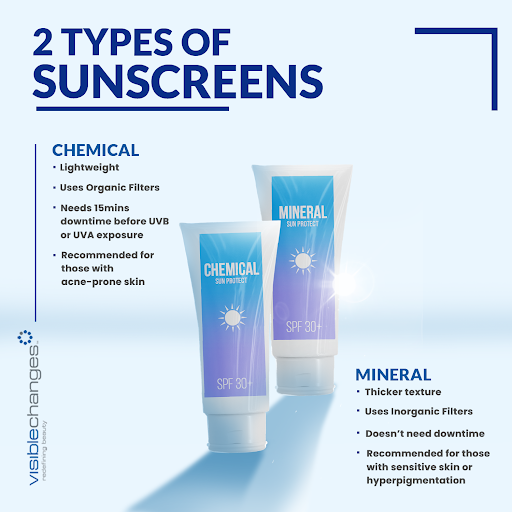Chemical Sunscreen vs. Mineral Sunscreen: What’s the Difference?

Summer season is here! What’s the first thing you do to start your day? Is SPF a part of your routine? It better be! In this blog, we’ll be talking about the essential skincare product: sunscreen! Did you know that there are two types of sunscreen: Chemical and Mineral? If you don’t, we’ll be happy to differentiate the two! But before that, there are a few things we’d like to reiterate about sunscreen in general.
SPF is crucial for your health
First, let’s straighten out some misunderstandings about sunscreen. Up to this day, there are still people who apply it occasionally. For instance, they only use sunscreen when they do activities like swimming or hiking. News flash! You’re supposed to apply sunscreen daily (and at times even re-apply)! Sunscreen is essential in your daily routine and shouldn’t be treated as an option. It’s a must! It doesn’t just prevent wrinkles, fine lines, and pigmentation. It protects your skin from UV rays so you can prevent skin cancer. That said, we insist that you make that healthy choice to apply sunscreen without fail daily.
Chemical Sunscreen
Now that we’ve settled how crucial SPF is in your daily routine, it’s time to talk about its kinds and what’s best for you! Let’s start with the more common Chemical Sunscreen. Composed of organic filters, it absorbs UV radiation then disperses energy as heat release. This formula is very lightweight, making it compatible with other products and more preferable for those who layer their skincare and makeup products. When applying, chemical sunscreens need at least 15minutes before exposure to UVB and UVA because it needs time to penetrate the outer layer of your skin.
Mineral Sunscreen
On the other hand, mineral sunscreen formulation is thicker compared to chemical sunscreen. It uses inorganic filters which reflect and scatter UV rays. This technique requires no absorption of UV light into the skin. Meaning it only sits on your skin’s surface, so it doesn’t need downtime to take effect, unlike chemical sunscreen. Mineral sunscreens are also said to be more “safe,” but this isn’t true! Both chemical and mineral sunscreens’ ingredients have been proven to pose no health concerns. Regardless, both mineral and chemical sunscreens serve the same purpose and goal: to protect your skin from UV rays.
Tips for deciding which sunscreen formula is right for you
Now that you know the difference, one question remains: which formula best suits you? Let’s go through some tips to help you decide which sunscreen is for your skin’s benefit! First up, go for a sunscreen that protects against UVA and UVB radiation and has at least 30 plus SPF (It’s still best to get 50+SPF). Second, let’s go to what best suits skin types! Mineral sunscreen is best for those with sensitive skin, eczema, rosacea, or for those prone to hyperpigmentation like melasma. Meanwhile, if your skin is acne-prone, it’s best to opt for something more lightweight, making chemical sunscreen a better option.
One last note! There’s no one-size-fits-all sunscreen. Choosing the right sunscreen for you will be a rigorous trial and error process. So stay patient! You’ll eventually find the product best suited for you, and it’s going to be worth it!
Source: https://www.broadsheet.com.au/national/fashion/article/chemical-versus-physical-or-mineral-sunscreen-explainer-try
